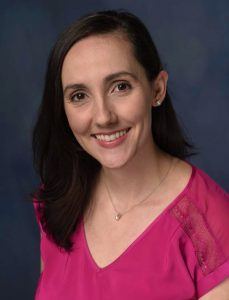 Natalie Exner Dean, PhD ’14
Natalie Exner Dean, PhD ’14
Assistant Professor in the Department of Biostatistics at the University of Florida in Gainesville, FL
Where do you currently work and what are your job responsibilities?
I am an Assistant Professor in the Department of Biostatistics at the University of Florida in Gainesville, FL. As part of the Center for Statistics in Quantitative Infectious Diseases (CSQUID) co-directed by Ira Longini and Betz Halloran, I study emerging pathogens, including epidemiological analysis of outbreaks and disease modeling. I am particularly interested in vaccine clinical trial design. Because outbreaks are often small and unpredictable, it is very hard to test vaccines for emerging pathogens. We had success working on an efficacy trial conducted in Guinea in 2015 that used a “ring vaccination” design to randomly allocate vaccine to the contacts and contacts of contacts of Ebola cases. The vaccine demonstrated high efficacy and has since been used in the 2018 outbreak in the Democratic Republic of the Congo. We are now working on vaccine trial designs for other emerging pathogens. As a junior faculty member, I also teach a course on survival analysis and have started to mentor graduate students.
What do you like most about your current position?
I love the flexibility of an academic position that allows me to set my own research agenda. I value the opportunity to work on new and exciting projects. I am fortunate to have amazing mentors at CSQUID. Through our ongoing work with the World Health Organization (WHO), I have also been able to interact with many other highly-respected senior faculty in our field. It is fantastic to work closely with them and learn from their experiences.
Why did you choose to study biostatistics and what led you to Harvard?
I have wanted to work in infectious diseases since taking a biology course in high school. While I initially thought I wanted to work as an HIV microbiologist, I quickly realized that I am better behind a computer than in the lab. In undergrad I was fortunate to work on a longitudinal cohort study that exposed me to the fields of epidemiology and biostatistics. My research mentor encouraged me to apply to PhD programs. I was of course drawn to the strength and reputation of the Biostatistics Department at Harvard, but I was also attracted to the exciting HIV and infectious disease research throughout the School of Public Health.
What was the most rewarding part of your degree program?
Passing the qualifying exam and defending my thesis were of course both very rewarding. During my coursework, I liked Methods II with Brent Coull and Analysis of Failure Time Data with Judith Lok. I kept copies of my notes for both courses and still occasionally refer to them. I think my all-time favorite course was Combatting Infectious Diseases in the Developing World with Richard Marlink and Kenneth Mayer. It was offered by the Department of Immunology and Infectious Diseases and almost certainly doesn’t exist anymore. The course was capped at 15 students, and I was the only biostatistician. Each week we read papers from the literature and took turns preparing presentations. We met with the instructors one-on-one and attended a dinner at Dr. Mayer’s home at the end of the semester. As someone who came directly from undergrad to a PhD, I loved participating in discussions with students from different departments who already had an impressive range of experiences in global health. During my time at Harvard, I also valued the opportunity to travel to exciting places, like China, Brazil, and Switzerland, through collaboration with WHO. And if Marcello Pagano asks you to teach at the summer school in Italy, you say yes!
What was the most challenging part of your degree program?
The first semester was challenging as the workload can feel very intimidating. I found it most efficient to work together with my classmates on problem sets. I learned the concepts while limiting the time I spent being desperately stuck on a problem. There is a lot of evidence to support the value of learning as part of a team! When I finished my coursework, I struggled early on with time management. There is a lot of freedom in how you structure your time, which is great but it also requires self-discipline. While other classmates worked from home or at coffee shops, I ultimately found that coming into the office every day and maintaining business hours worked best for me, which kept my weekends open for time with friends and family.
How did your experience at Harvard prepare you for your career?
Through my courses I learned core statistical principles, and I have a general understanding of the many different types of statistical methods that are out there. The most valuable preparation, though, was learning how to conduct independent research, including how to work through problems when the answer isn’t in the back of the book. Research involves a lot of frustration and dead ends, but now I find the process to be very rewarding. I am also grateful to now be part of a large network including my former classmates and professors. Everyone is off doing great things, and it is fun to reconnect at alumni events at ENAR or JSM.
What advice would you give to current or prospective students?
In my first year, I received some great advice from graduating students that I have tried to pass along. Apply, apply, apply. For awards, scholarships, travel funds, everything. There are a lot of resources available to graduate students. While there will always be a lot of rejection in academia, what you can control is the denominator. (Sage words from a friend.) You never know what opportunities might open up!



